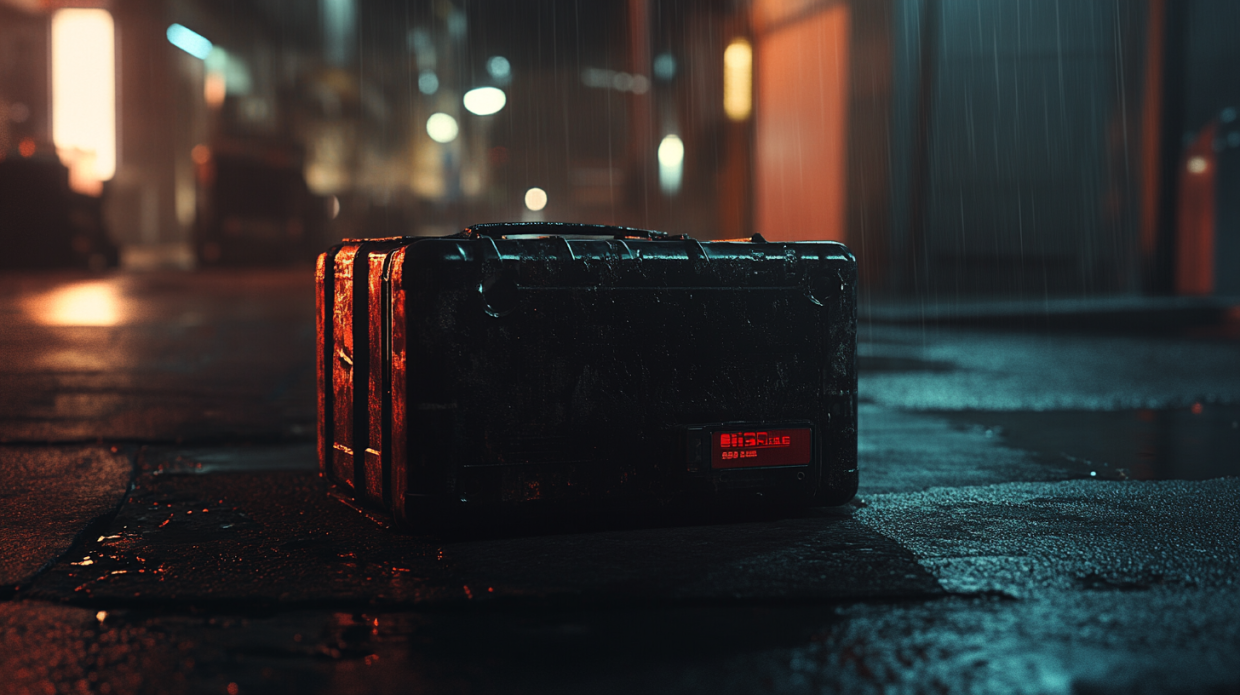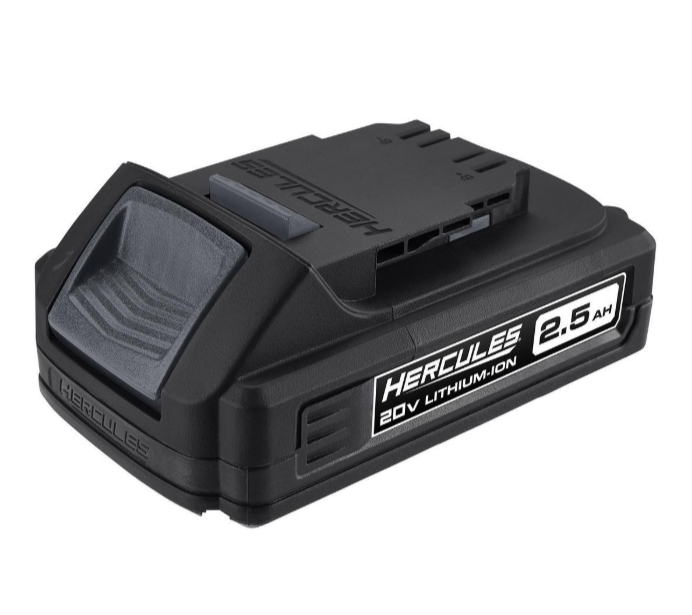
HERCULES 20V 2.5 Ah Lithium-Ion Compact Battery
- With 20V, 2.5 Ah of power at your command, the HERCULES™ Lithium-Ion Compact Battery delivers more power, longer runtime and less downtime. The easy-view fuel gauge tells you exactly how much power remains before you need to recharge. This hardworking battery is designed to withstand impact, extreme weather and long times in storage.
- Industry leading quality lithium-ion battery cells
- Impact resistant – holds up to jobsite abuse
- Easy-view fuel gauge displays battery charge level
- Thermal control extends battery durability
- Works with all HERCULES™ 20V cordless tools
$24.97
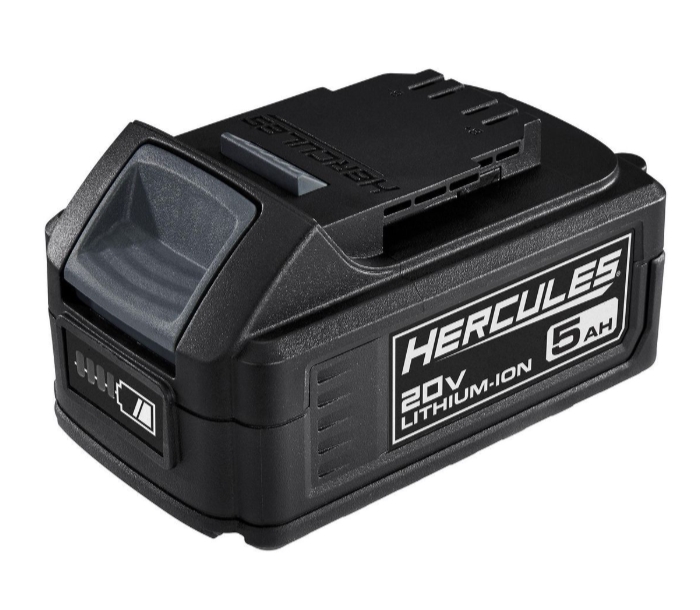
HERCULES 20V 5 Ah Extended Performance Lithium-Ion Battery
- With 20V 5 Ah of power at your command, the HERCULES™ Extended Performance Lithium-Ion Battery delivers more power, longer runtime, and less downtime*. This hardworking battery is made to withstand impact, extreme weather, and long times in storage.
- Industry-leading quality lithium-ion battery cells
- Innovative temperature and overload protection optimizes performance for longer battery life
- Easy-view fuel gauge displays remaining charge
- Durable impact-resistant housing protects against drops and vibration
- Works with all HERCULES™ 20V cordless tools
$74.99
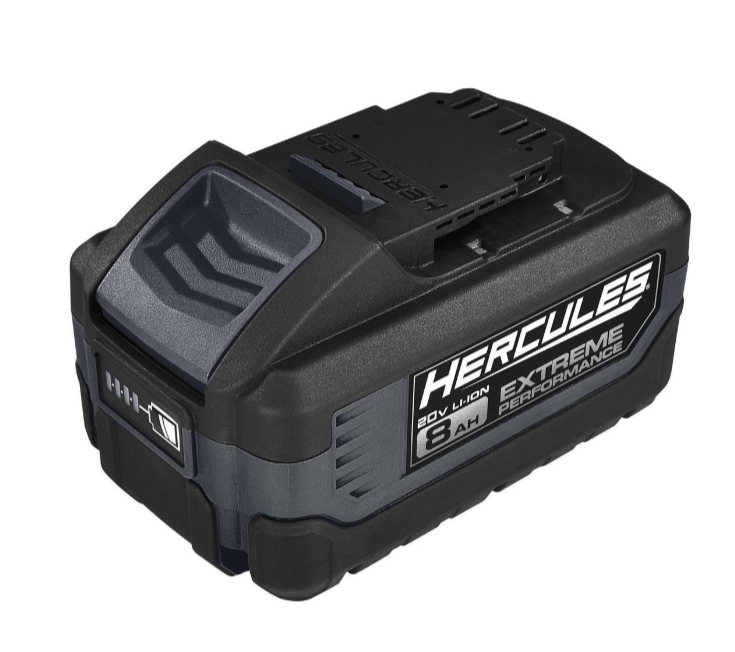
HERCULES 20V 8 Ah Extreme Performance Lithium-Ion Battery
- This HERCULES™ 20V 8 Ah Extreme Performance Lithium-Ion Battery uses 21700 battery cell technology for more power and runtime. Extreme Performance technology ensures that this battery is optimized for high-demand tools in order to power through some of the toughest jobs. Get up to 35% more power*, 60% more runtime** and 50% more cuts per charge*** than the standard Hercules 5.0 Ah pack. The easy-view fuel gauge tells you exactly how much power remains before you need to recharge.
- Designed for high-demand tools to power through the toughest jobs
- Innovative temperature and overload protection optimizes the battery and tool during heavy use
- High performance lithium-ion battery cells
- Impact resistant overmold increases protection from drops and jobsite debris
- Works with all HERCULES™ 20V cordless tools
$109.99
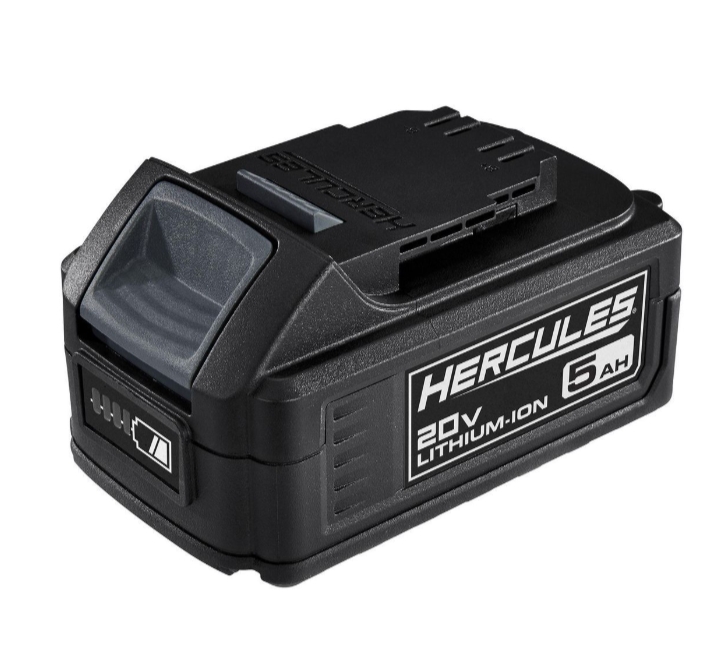
HERCULES 20V 5 Ah Extended Performance Lithium-Ion Battery
- With 20V 5 Ah of power at your command, the HERCULES™ Extended Performance Lithium-Ion Battery delivers more power, longer runtime, and less downtime*. This hardworking battery is made to withstand impact, extreme weather, and long times in storage.
- Industry-leading quality lithium-ion battery cells
- Innovative temperature and overload protection optimizes performance for longer battery life
- Easy-view fuel gauge displays remaining charge
- Durable impact-resistant housing protects against drops and vibration
- Works with all HERCULES™ 20V cordless tools
$74.99
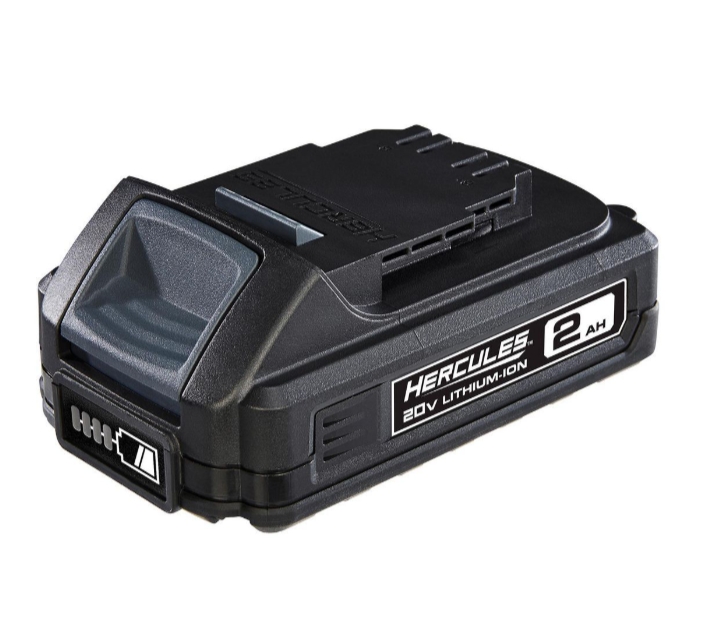
HERCULES 20V 2 Ah Lithium-Ion Compact Battery
- This HERCULES™ 20V 2 Ah Lithium-Ion Compact Battery is durable, reliable, and lightweight for quick jobs. The easy-view fuel gauge tells you exactly how much power remains before you need to recharge. This hardworking battery is made to withstand impact, extreme weather, and long periods in storage.
- Industry-leading quality lithium-ion battery cells
- Impact resistant – holds up to jobsite abuse
- Easy-view fuel gauge displays battery charge level
- Thermal control extends battery durability
- Works with all HERCULES™ 20V cordless tools
$34.99
As I stood in my garage surrounded by half-finished projects and tools scattered everywhere, I realized something important: I was only as good as the power source running my equipment. After years of wrestling with subpar batteries that died mid-project, I finally decided to invest in quality. That’s when I discovered the Hercules 20V battery system, and I’ve never looked back.
If you’re considering making the switch or just want to expand your current Hercules collection, you’ve come to the right place. After countless hours using these batteries across dozens of projects, I’m sharing everything I’ve learned to help you make the best choice for your needs. The right battery choice can literally transform your entire DIY or professional experience, and I’m here to guide you through it all.
What Exactly Is a Hercules 20V Battery and What’s It Used For?
When I first entered the world of cordless tools, I was overwhelmed by the options. The Hercules 20V battery is essentially the heart of Harbor Freight’s premium cordless tool lineup. These lithium-ion powerhouses deliver a consistent 20 volts of maximum power (18 volts nominal) to a wide range of tools.
In my experience, these batteries are the workhorses behind everything from drills and impact drivers to circular saws and angle grinders. I’ve used mine for everything from building a backyard deck to installing kitchen cabinets and even some automotive work. The versatility is truly impressive.
What I love most is how these batteries have eliminated the frustration of being tethered to power outlets. I remember trying to install crown molding in my living room with a corded drill, extension cords snaking across the floor, constantly unplugging and replugging as I moved around the room. Switching to Hercules cordless tools powered by these 20V batteries was nothing short of liberating.
Battery Longevity: How Long Will Your Hercules 20V Battery Last?
Let’s talk about the question everyone asks first: how long do these batteries last? This breaks down into two separate considerations—runtime per charge and overall lifespan.
For runtime, I’ve found that the standard 2.5Ah (amp-hour) battery typically gives me about:
- 30-45 minutes of continuous use with power-hungry tools like circular saws
- 1-2 hours with moderate-use tools like drills and impact drivers
- Several hours with lighter tools like LED work lights
The beefier 5.0Ah batteries essentially double these runtimes, which has been a game-changer for my longer projects. I was skeptical about paying more for the higher capacity at first, but after spending an entire Saturday building a pergola without stopping to recharge, I was sold.
As for overall lifespan, I’m still using my original Hercules batteries from three years ago. After approximately 200-300 charge cycles, I’ve noticed maybe a 15% reduction in runtime, which is actually impressive compared to some other brands I’ve used. The lithium-ion chemistry really does make a difference compared to older NiCad batteries that seemed to die overnight.
The Charging Process: Keeping Your Projects Powered Up
Learning how to properly charge these batteries took me a bit of trial and error. The standard Hercules charger that came with my drill kit takes about 60 minutes to fully charge a depleted 2.5Ah battery. The 5.0Ah batteries naturally take longer—around 90-120 minutes in my experience.
One thing I discovered the hard way: don’t wait until your battery is completely dead before charging. I’ve found that putting my batteries on the charger when they’re around 25% capacity helps maintain their overall health. It’s a habit that took time to develop, but now I automatically plug in a battery whenever I’m taking a lunch break or switching tasks.
The chargers themselves are pretty straightforward—plug them in, insert the battery, and watch for the LED indicator. A flashing green light means it’s charging, while a solid green means you’re good to go. If you see a red light flashing, that usually indicates a problem with the battery or that it’s too hot/cold to charge safely.
I keep two chargers in different areas of my workspace, which has been a time-saver during bigger projects. Nothing kills momentum like waiting for a battery to charge when you’re in the zone.
Where to Buy: Finding the Best Deals on Hercules 20V Batteries
When I first started building my Hercules collection, I didn’t realize there were multiple purchasing options. While Harbor Freight Tools is the primary retailer (they’re the exclusive carrier of the Hercules brand), there are several ways to acquire these batteries.
In-store purchases at Harbor Freight have been my go-to, especially when they run their famous coupon specials. I’ve saved between 20-30% on batteries this way. Their website also frequently offers bundle deals that aren’t always advertised in-store.
I’ve occasionally found unused Hercules batteries on marketplace sites like eBay or Facebook Marketplace, often from contractors who’ve switched systems or DIYers who bought more than they needed. Just be cautious—I once purchased what I thought was a great deal on a 5.0Ah battery, only to discover it was a counterfeit that died after two weeks.
Harbor Freight’s Inside Track Club membership has also netted me some exclusive battery deals. The membership fee pays for itself if you’re buying several batteries or tools throughout the year.
Compatibility Concerns: Will It Work With Your Tools?
Understanding battery compatibility is critical before investing in any cordless tool system. I learned this lesson when I tried using my new Hercules battery with an older Harbor Freight Drill Master drill—it simply wouldn’t fit.
Hercules 20V batteries are designed specifically for Hercules 20V tools. They won’t work with other Harbor Freight lines like Bauer, Drill Master, or Chicago Electric. They also won’t work with other major brands like DeWalt, Milwaukee, or Makita despite the similar voltage rating.
Within the Hercules line, however, I’ve found excellent cross-compatibility. My 5.0Ah batteries work perfectly with my older Hercules drill that originally came with a 2.5Ah battery. This universal compatibility within the brand is what ultimately convinced me to go all-in on the Hercules ecosystem.
For those wondering about adapters—yes, they exist, but I’d caution against them. I tried a universal adapter that claimed to make my Hercules batteries work with my old DeWalt tools, and while it physically connected, the performance was inconsistent, and I was worried about potential damage to both the tools and batteries.
Price Considerations: What You’ll Pay for Hercules Power
Let’s talk money—after all, that’s a huge factor in any tool decision. Hercules 20V batteries range in price from about $39.99 for the standard 2.5Ah battery to $79.99 for the high-capacity 5.0Ah version when purchased separately.
These prices position Hercules in what I’d call the “prosumer” category—more expensive than budget brands but significantly cheaper than premium professional brands like Milwaukee or DeWalt, which can run $20-40 more for comparable capacity.
In my cost analysis, I’ve found the sweet spot is buying batteries as part of tool kits initially. My impact driver kit came with a 2.5Ah battery and charger for just $30 more than the bare tool, which is less than buying them separately.
Harbor Freight occasionally runs battery promotions where you can get a free battery with the purchase of certain tools, which is how I’ve expanded my collection most economically. Their holiday sales are particularly good for battery deals.
When considering the overall value, I factor in the three-year warranty that comes standard with Hercules batteries. This warranty has saved me once already when a battery unexpectedly stopped holding a charge after about 18 months.
Comparing Hercules to the Competition: How Do They Stack Up?
Having used several different battery platforms over the years, I have some perspective on how Hercules compares to other brands.
Against premium brands like Milwaukee, DeWalt, and Makita, Hercules offers about 80-90% of the performance at roughly 60-70% of the cost. The main differences I’ve noticed are in extreme conditions and with very high-demand tools. When I borrowed my neighbor’s Milwaukee chainsaw, I could tell the battery management system was more sophisticated than my Hercules equivalents, particularly in how it handled heat.
Compared to other mid-range brands like Ryobi or Ridgid, Hercules batteries seem to maintain their power more consistently throughout the discharge cycle. With my old Ryobi tools, I noticed a more pronounced power drop as the battery depleted, which was frustrating when trying to drive large screws or cut dense materials.
The build quality of Hercules batteries also impresses me. The plastic housing feels solid, the connecting points are robust, and they’ve survived several accidental drops in my workshop without issue.
Checking Battery Status: How to Know When You’re Fully Charged
One feature I’ve come to appreciate on the Hercules batteries is the built-in charge indicator. By pressing the small button on the battery, LED lights illuminate to show the approximate remaining capacity:
- 3 lights = 70-100%
- 2 lights = 30-70%
- 1 light = less than 30%
- Flashing light = nearly depleted
This simple system has saved me countless trips back to the charger. Before starting any significant project, I make it a habit to check all my batteries so I can prioritize which ones to use first.
On the charger itself, the indicators are straightforward but effective. A solid green light means charging is complete. I’ve found that leaving a fully charged battery on the charger won’t damage it, but I typically remove them once charged to make space for the next battery in line.
For more precise monitoring, I sometimes use a multimeter to check the actual voltage. A fully charged 20V Hercules battery typically reads around 20.8-21 volts, while one ready for charging will be around 18 volts.
Backward Compatibility: Will New Batteries Work With Older Tools?
When Hercules first launched, I was hesitant to invest heavily in case they changed their battery design with later generations. Fortunately, Harbor Freight has maintained excellent backward compatibility.
My newest 5.0Ah Hercules batteries work perfectly with my original Hercules drill from several years ago. This commitment to compatibility gives me confidence that future batteries will continue to work with my existing tool collection.
The only exception I’ve encountered involves some very early Hercules tools that had slightly different battery connections. If you’ve got tools from when the line first launched (around 2017), it might be worth bringing your tool to a Harbor Freight store to check compatibility before purchasing new batteries.
Understanding the Warranty Protection for Your Investment
The Hercules batteries come with a 90-day satisfaction guarantee and a three-year limited warranty, which provides good peace of mind. My experience with warranty service has been straightforward—when one of my batteries failed, I brought it to my local Harbor Freight with the receipt, and they replaced it on the spot.
I recommend keeping your receipts (I take photos of mine and store them in a dedicated folder on my phone) and registering your purchase on the Harbor Freight website, which can simplify the warranty process.
The warranty covers manufacturing defects but not normal wear and tear or abuse. In my case, the battery that failed had a legitimate internal issue that the store recognized immediately as a warranty claim.
Troubleshooting: Why Your Hercules Battery Might Not Be Charging
I’ve had a few moments of panic when a battery wouldn’t charge, but I’ve learned that most issues have simple solutions:
- Check the connections – Dust and debris can block the connection points. I clean mine regularly with compressed air.
- Temperature sensitivity – These batteries won’t charge if they’re too hot or too cold. After using a battery heavily, I let it cool down before charging. Similarly, batteries stored in my unheated garage during winter need to warm up before they’ll accept a charge.
- Reset the charger – Unplugging the charger for 30 seconds and plugging it back in has resolved charging issues for me on multiple occasions.
- Battery protection circuit – If a battery has been completely drained below its safe threshold, the internal protection circuit may prevent charging. Sometimes leaving it on the charger for several hours will reset this protection.
If none of these steps work, it might be time to use that warranty. In my experience, about 1 in 15 batteries might develop an issue within the warranty period, which is comparable to other brands I’ve used.
Maintenance Tips: Maximizing Your Battery’s Lifespan
Over the years, I’ve developed a maintenance routine that seems to extend the life of my Hercules batteries:
- Store at partial charge – I aim to store batteries at about 40-60% charge rather than fully charged or depleted.
- Keep them clean – I regularly clean the contact points with a soft brush and occasionally with electrical contact cleaner.
- Avoid extreme temperatures – I don’t leave batteries in hot vehicles or freezing garages.
- Use regularly – Even if I don’t need a particular tool, I try to cycle through all my batteries every few months to keep them active.
- Don’t completely drain them – I switch batteries when they get low rather than running them until they’re completely dead.
Following these simple practices, my oldest Hercules batteries are still going strong after several years of regular use.
Performance in Extreme Conditions: Cold Weather Considerations
Living in an area with cold winters, I’ve had to adapt my battery usage strategies. I’ve found that Hercules 20V batteries, like most lithium-ion batteries, experience reduced performance in cold temperatures—typically about 30-50% less runtime when working in temperatures below freezing.
My workaround has been to keep spare batteries in an insulated lunch cooler with a hand warmer (not directly touching the batteries) when working outside in winter. This maintains them at a more optimal temperature until I need them.
I’ve also noticed that charging is significantly slower in cold environments. My solution has been to bring batteries inside to charge them at room temperature, which is much more efficient.
One important note: while using these batteries in cold weather is generally safe (though with reduced performance), charging them when they’re very cold can damage them. I always make sure batteries have warmed up to at least 40°F before attempting to charge them.
Monitoring Battery Health: How to Check Your Battery’s Condition
Beyond the basic charge indicator, there are a few methods I use to track my batteries’ overall health:
- Runtime testing – Occasionally, I’ll time how long a fully charged battery lasts in a specific tool compared to when it was new. This gives me a practical measure of any capacity degradation.
- Recovery time – How quickly a battery recharges can indicate its health. Batteries that take significantly longer to charge than when new may be deteriorating.
- Heat during use – Excessive heat during normal use often indicates a battery is struggling and may be nearing the end of its useful life.
- Weight comparison – A battery that feels noticeably lighter than identical models might have internal damage or degradation.
Using these methods, I’ve been able to predict when a battery is likely to fail and replace it before it leaves me stranded in the middle of a project.
Real-World Runtime: What to Expect on a Single Charge
Through my various projects, I’ve developed a good sense of what runtime to expect from different capacity Hercules batteries:
With the 2.5Ah battery:
- Drill/Driver: 300-400 1¼” screws in softwood
- Impact Driver: 250-300 3″ deck screws
- Circular Saw: About 20-25 cuts through 2×4 lumber
- Reciprocating Saw: 15-20 minutes of continuous cutting
- LED Work Light: 5-7 hours of continuous use
With the 5.0Ah battery:
- Drill/Driver: 600-800 1¼” screws in softwood
- Impact Driver: 500-600 3″ deck screws
- Circular Saw: About 50-60 cuts through 2×4 lumber
- Reciprocating Saw: 35-45 minutes of continuous cutting
- LED Work Light: 10-14 hours of continuous use
These numbers have helped me plan my projects and determine how many batteries I need to have charged and ready.
What’s In the Box: Do Hercules Batteries Include a Charger?
When purchasing Hercules batteries, it’s important to know what you’re getting. In my experience, individual batteries sold separately typically do not include a charger. The charger must be purchased separately or as part of a tool kit.
Tool kits usually include one battery and one charger. The exception is with premium combo kits, which might include multiple batteries and sometimes a dual-port charger that can charge two batteries simultaneously.
For someone just entering the Hercules ecosystem, I recommend starting with a drill or impact driver kit that includes a battery and charger. Then you can expand your battery collection through standalone battery purchases.
The standard Hercules charger costs around $30 when purchased separately, while the faster charger runs about $50. In my workshop, I have both—the standard one for overnight charging and the fast charger for midday recharges when I’m on a deadline.
Environmental Responsibility: Recycling Your Old Batteries
When a battery has finally reached the end of its useful life, responsible disposal is important. Lithium-ion batteries should never go into regular trash due to fire risks and environmental concerns.
I’ve found several options for recycling:
- Many Harbor Freight stores will accept old Hercules batteries for recycling
- Home improvement stores like Home Depot and Lowe’s typically have battery recycling collection points
- Local hazardous waste collection facilities accept lithium-ion batteries
- Some electronics retailers offer battery recycling programs
Before recycling, I place electrical tape over the battery terminals to prevent any short circuits during transportation. I also make sure to fully discharge the battery for safety.
While it can be tempting to try to rebuild these batteries with new cells, I’d caution against this unless you have specific expertise. The battery management systems are complex, and improper reassembly can create serious safety hazards.
Heavy-Duty Applications: Can Hercules Handle Professional Demands?
As someone who uses these batteries for both DIY projects and some professional applications, I’ve pushed them to their limits. In my assessment, Hercules batteries hold up remarkably well for moderately demanding professional use.
For contractors who use tools daily but not continuously all day, these batteries provide excellent value. They handle tasks like framing, cabinet installation, and general carpentry without issue.
Where I’ve noticed limitations is in extremely demanding applications like commercial concrete drilling or production-level metalworking. In these scenarios, premium professional brands still have an edge in thermal management and extreme-use durability.
The sweet spot for Hercules seems to be the serious DIYer, part-time professional, or full-time pro who doesn’t push their tools to the absolute limit daily. For these users, the price-to-performance ratio is exceptional.
Compatible Tools: Expanding Your Hercules Ecosystem
One of the reasons I’ve invested in multiple Hercules batteries is the expanding range of compatible tools. Currently, my collection includes tools powered by these batteries:
- Drill/Driver
- Impact Driver
- Circular Saw
- Reciprocating Saw
- Angle Grinder
- Jigsaw
- Multi-Tool
- LED Work Light
- Leaf Blower
- Brad Nailer
Harbor Freight continues to expand the Hercules line, adding new tools that use the same 20V battery platform. This compatibility has allowed me to add tools without needing to invest in different battery systems.
Before purchasing a new Hercules tool, I always verify it uses the same 20V battery platform, as Harbor Freight does produce some Hercules tools with different power sources.
User Experiences: What Others Are Saying About Hercules Batteries
I’m not alone in my positive experience with these batteries. Talking with other users at Harbor Freight and reading online reviews, the consensus seems to be that Hercules batteries offer excellent value for their price point.
Professional users particularly appreciate the 5.0Ah batteries for their extended runtime, while DIYers often mention the durability as a key positive. Some users report their batteries still performing well after 4+ years of regular use.
The most common criticisms involve the batteries’ performance in extreme heat (above 100°F), where thermal protection sometimes kicks in and temporarily disables the battery. Some users also note that the highest-demand tools like the circular saw perform noticeably better with the higher-capacity batteries.
Overall, satisfaction ratings tend to hover around 4.2-4.5 out of 5 stars across various review platforms, which aligns with my personal experience.
Final Thoughts: Is the Hercules 20V Battery Right for You?
After years of using these batteries across countless projects, my recommendation comes down to your specific needs:
If you’re a casual DIYer who uses tools occasionally for home repairs and small projects, the standard 2.5Ah Hercules batteries offer excellent value and performance that will likely exceed your needs.
For serious DIYers and light-duty professionals, investing in a mix of 2.5Ah and 5.0Ah batteries provides versatility—use the smaller ones for lighter tasks and the larger capacity batteries for power-hungry tools and all-day projects.
Full-time professionals with extremely demanding applications might be better served by premium brands, but will pay significantly more for that last 10-15% of performance and durability.
The true value of the Hercules 20V battery system lies in its balance of performance, durability, and cost – something I’ve come to appreciate more with each project I complete. Whatever your needs, understanding the capabilities and limitations of these batteries will help you make the most of your investment and keep your projects powered for years to come.
Standing in my workshop surrounded by tools that have helped me create everything from furniture to home renovations, I can confidently say that my Hercules batteries have earned their place in my arsenal. They’ve been reliable companions through countless projects, and I expect them to power many more in the years to come.






